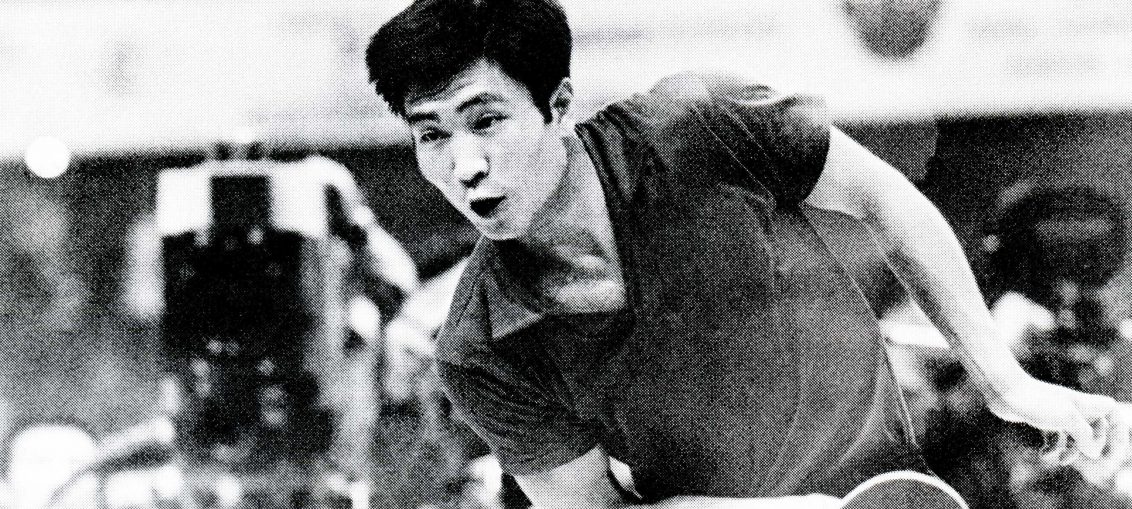
Xi Enting, always in control of his emotions (Photo: courtesy of Table Tennis Legends)
by Ian Marshall, Editor
Winner of the men’s singles title at the World Championships in 1973, China’s Xi Enting passed away on Sunday 27th October; he was 73 years old.
A memorial service, attended by members of the Chinese national team, was held in Beijing on Saturday 2nd November.
Born on Tuesday 3rd January 1946 in Tangshan, Hebei Province, he practised at the Baoding Amateur Sports School, entering the Chinese national team when 19 years old.
Right handed, adopting the traditional pen-hold grip style of play, short pimpled rubber using one side of the racket only, physically Xi Enting was different to his contemporaries, he was tall and strong. Thus when the ball was played wide, he was able to cover the angles. However, being involved in rallies was not his forte, his style was simple, serve, wait for the return and then win the point outright with a devastating forehand.
A stoic character, whether in victory or defeat his reaction was the same, there was no sign of emotion; it was perhaps that trait which stood him in good stead on the international scene.
He made his debut at the World Championships in 1971 in Nagoya, in those days matches in team events at international tournaments were best of three games, in singles events best of five, each game to 21 points.
Success accrued, he was a member of the successful gold medal winning outfit in the men’s team event alongside Li Furong, Li Jingguang, Liang Geliang and Zhuang Zedong; later he reached the men’s singles semi-finals losing to Sweden’s champion elect, Stellan Bengtsson (21-19, 21-19, 21-19).
It was a tournament which had a special significance. It marked the return of China to the international scene; owing to the Cultural Revolution, China has not played in a World Championships since 1965 in Ljubljana.
Two years later in 1973 in Sarajevo, Xi Enting was once again on duty but in the men’s team event, he played in just one fixture; illustrious colleagues Liang Geliang, Li Jingguang, Xu Shaofa and Diao Wenyuan were preferred. China finished in runners up spot, the title being won by Sweden who selected from Stellan Bengtsson, Anders Johansson, Kjell Johansson, Bo Persson and Ingemar Wikström.
Resigned to the bench, the decision was understandable; his results in open international tournaments had been very mediocre. Notably, at the 1971 Scandinavian Open he had lost in the opening round as he had at the 1973 Afro-Asian-Latin American tournament.
The win in Sarajevo was not to be anticipated. In the men’s singles event Xi Enting proved any doubters wrong. He beat Hungary’s Matyas Beleznay, the Soviet Union’s Stanislav Gomozkov and Czechoslovakia’s Milan Orlowski to reach the semi-finals, where he continued his good form to overcome Yugoslavia’s Anton Stipancic.
Against Antun Stipancic every game he had won had been very narrowest of margins (21-19, 21-19, 12-21, 20-22, 21-19). In the final facing Sweden’s Kjell Johansson it was virtually the same, the match went the full distance.
In the deciding game it was parity at 15-all. Kjell Johansson recovered but at 20-18 Xi Enting held two match points. Kjell Johnsson served, he directed the play towards the body of Xi Enting to nullify his adversary’s strong forehand, the Swede followed on the third ball by again directing his play to the body of Xi Enting, the return clipped the edge of the table. A moment of sheer fortune, by a millimetre Xi Enting was the world champion (21-18, 13-21, 13-21, 21-19, 21-18).
Was it destiny or did he have a little help from his left arm? On that arm he had tattooed sayings by great Chinese philosophers; he would glance at the arm for inspiration.
The mental fortitude, inscrutable; his strong character was also evident in the men’s doubles; partnering Wang Wenhuan, facing Japan’s Mitsuru Kohno and Tokio Tasaki, the duo trailed two games to one and were down 20-14 in the fourth; they saved all six match points, won the next two and the match (16-21, 11-21, 21-19, 22-20, 21-8). They were beaten in the next round, the quarter-finals, by Yugoslavia’s Antun Stipancic and Dragutin Surbek (15-21, 21-16, 16-21, 21-7, 21-13).
Two years later in 1975 in Calcutta, after accounting for Hungary’s Gabor Gergely in a best of five games match (21-11, 21-9, 21-18), Antun Stipancic extracted revenge; he beat Xi Enting in the quarter-finals (21-8, 21-23, 21-23, 21-7, 21-17). The defeat was to prove the swansong, the international career was over.
Success at the World Championships, in addition at the Asian Championships he claimed a creditable medal haul. In 1972 in Beijing he was a men’s singles and men’s team silver medallist, as well as a men’s doubles bronze medallist partnering Liang Geliang; two years later in Yokohama it was the same in the men’s singles and with Xu Shaofa in the men’s doubles. Rather differently, in the men’s team the colour was gold.
One can only wonder had there not been what amounted to a six year absence from the international scene from 1965 to 1971, would the medal collection enjoyed by Xi Enting have been much greater?
Playing days over, Xi Enting turned his hand to coaching; in addition to his native China, countries such as France, Italy, Mexico and Slovenia benefitted from his knowledge.
He married Lin Meiqin, silver medallist in three consecutive World Championships; in the women’s team event at the 1971 World Championships alongside Li Li, Lin Huiqin and Zheng Minzhu, in the women’s doubles in 1973 when partnering Qiu Baoqin and in 1975 in harness with Zhu Xiangyun.
Sadly, he died as a result of a thoracic aortic rupture.
